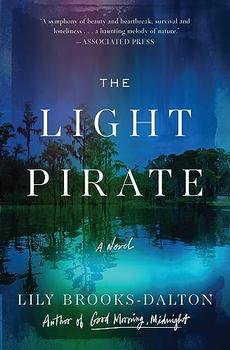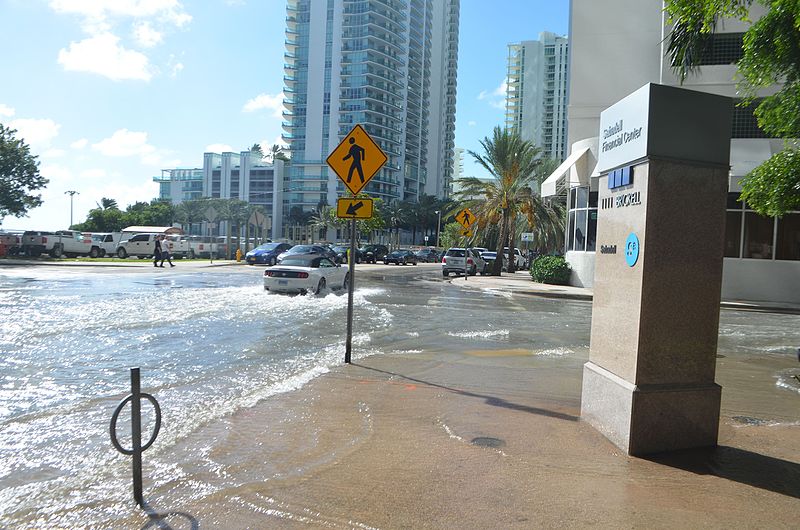Summary | Excerpt | Reading Guide | Reviews | Beyond the Book | Read-Alikes | Genres & Themes | Author Bio

This article relates to The Light Pirate
 Climate change is an international problem but its impact can already be felt more intensely in certain areas. This is particularly true in locations that are warm and coastal, which are more susceptible to the effects of increased temperatures, rising sea levels, worsening tropical storm systems and erosion. Florida is one such example, and author Lily Brooks-Dalton explores the potential future of the climate disaster for the state's residents in her novel The Light Pirate.
Climate change is an international problem but its impact can already be felt more intensely in certain areas. This is particularly true in locations that are warm and coastal, which are more susceptible to the effects of increased temperatures, rising sea levels, worsening tropical storm systems and erosion. Florida is one such example, and author Lily Brooks-Dalton explores the potential future of the climate disaster for the state's residents in her novel The Light Pirate.
As the world's oceans grow warmer and rainfall escalates, storms are able to form from greater potential energy, resulting in more intense weather systems. Florida's unique geographical location — between the Gulf of Mexico and the Atlantic Ocean — puts it in the direct path of tropical storms that sweep across the area. It has been hit by more than 40% of all hurricanes to land on US soil, more than any other state. And as the region has logged hurricane activity considered to be above normal for seven consecutive years as of 2022, it's clear that climate change is taking its toll.
These storms, coupled with eroding coastlines and increased rainfall, make flooding a major threat. Many lowland areas struggle to drain floodwaters effectively, meaning the damage caused by each flood can become increasingly difficult to recover from. More than 1.5 million people in Florida already live in areas at elevated risk of inland flooding.
The state is not only at the mercy of water damage, however: Rising temperatures are also of great concern. Ten of the 25 hottest cities in the US are located in Florida, with Miami clocking in at number one on the list. Air temperatures have been on a steady incline for years, and with this rise, the number of "dangerous heat days" is also projected to swell. To put this into context, Florida currently has 25 dangerous heat days in an average year. By 2050, the state is predicted to experience at least 130 dangerous heat days annually (temperatures higher than 105°F/40°C), more than anywhere else in the country.
This all merely scratches the surface of climate change's repercussions for Florida residents. Other side effects include increased property prices (as storms continue to damage infrastructure and reduce the availability of safe housing) widening the gap between rich and poor. Climate change is also increasing the length of the breeding season for mosquitos (as they thrive in warm, moist environments). This facilitates the spread of disease, further endangering Florida's residents.
While much of the damage already caused by climate change is thought to be irreversible, it is still possible to slow its progress. On a grand scale, greener practices are a must, but individual coastal areas known to be at risk — like West Palm Beach, for example — can also take steps to fortify themselves. This may include installing higher seawalls and elevating infrastructure to better resist the rising tide.
While the current real-world stats and the future depicted in books such as The Light Pirate can be frightening, hopefully people will take these things as a warning to act now rather than later. As Brooks-Dalton shows, it takes concerted effort from united communities to adapt and survive in difficult times.
High tide flooding on Brickell Bay Drive in Miami, Florida on October 17, 2016. Photo by B137 (CC BY-SA 4.0)
Filed under Nature and the Environment
![]() This "beyond the book article" relates to The Light Pirate. It originally ran in February 2023 and has been updated for the
April 2024 paperback edition.
Go to magazine.
This "beyond the book article" relates to The Light Pirate. It originally ran in February 2023 and has been updated for the
April 2024 paperback edition.
Go to magazine.
I like a thin book because it will steady a table...
Click Here to find out who said this, as well as discovering other famous literary quotes!
Your guide toexceptional books
BookBrowse seeks out and recommends the best in contemporary fiction and nonfiction—books that not only engage and entertain but also deepen our understanding of ourselves and the world around us.